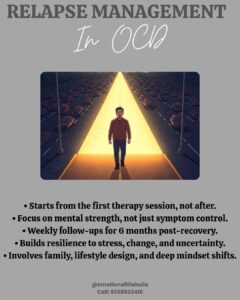
What Is Relapse in OCD?
Relapse in Obsessive-Compulsive Disorder (OCD) occurs when a person returns to a previous state of distress, marked by the reappearance of obsessive thoughts and compulsive behaviors after a period of improvement or recovery. This typically happens after therapy has ended or when ongoing support is reduced. Relapse is not a failure—it’s a sign that deeper emotional, cognitive, or behavioral patterns may still need attention.
What Is OCD Recovery?
OCD recovery is the phase in which a person no longer experiences disruptive obsessions or compulsions and has regained control over their thoughts, emotions, and behavior. At Emotion of Life, we define recovery as not just the absence of symptoms, but the presence of mental flexibility, emotional stability, and the ability to handle uncertainty without resorting to compulsions.
Recovery includes:
- Complete resolution of OCD symptoms.
- A 4-week maintenance period with no recurrence.
- Continued weekly follow-ups for 6 months to consolidate changes and build long-term resilience.
What Is Relapse Management in OCD?
Relapse management in OCD is not just about preventing setbacks—it’s about building lasting psychological strength and learning how to stay well, even in the face of life’s challenges. At Emotion of Life, we understand that real recovery from OCD isn’t only about reducing symptoms—it’s about reshaping how a person thinks, feels, and responds to the world around them.
That’s why, unlike many approaches, relapse management in OCD at Emotion of Life begins during the core treatment sessions, not afterward. We believe prevention is most effective when it’s built alongside recovery—not after symptoms return.
Definition of Relapse Management
Relapse management in OCD is the structured process of helping people maintain their recovery by strengthening thought patterns, emotional regulation, and behavioral habits that protect against the return of OCD symptoms.
It involves:
– Identifying and addressing early warning signs.
– Practicing tools for stress, uncertainty, and emotion regulation.
– Maintaining supportive habits and mental routines.
– Receiving consistent follow-up and therapeutic guidance.
At Emotion of Life, this process is not a separate phase—it’s a natural extension of the recovery work we start from the first session.
Why Is It Important?
Many people improve with therapy, only to relapse later because the deeper psychological roots of OCD were left unaddressed. OCD tends to resurface under stress, life transitions, or when supportive routines are disrupted.
Without relapse management in OCD, recovery can be short-lived.
At Emotion of Life, we treat relapse prevention as a core component of recovery. It’s how we help clients:
– Stay emotionally stable.
– Strengthen flexible thinking.
– Face challenges without reverting to old compulsions.
– Build a long-term recovery lifestyle.
When Does Relapse Management Begin at Emotion of Life?
A unique part of our approach at Emotion of Life is that relapse management in OCD begins from the first stages of therapy itself. While we work on reducing symptoms, we are also preparing each client with the mindset, habits, and tools they’ll need long after therapy ends.
Rather than waiting for a relapse to happen, we build relapse prevention into every session by:
– Teaching how to manage daily emotional fluctuations.
– Building cognitive flexibility from early exposure tasks.
– Addressing personality traits that feed OCD from the inside.
This forward-thinking design ensures relapse is less likely—and easier to handle if it ever arises.
What Does Emotion of Life Do in OCD Relapse Management?
At Emotion of Life, our entire recovery model integrates relapse management in OCD as a built-in priority. Here’s how we support clients:
- Structured Weekly Follow-Ups (Post-Recovery Phase)
Once symptom control is achieved, clients continue therapy for 6 months with focused weekly sessions aimed at:
– Detecting early signs of relapse.
– Reinforcing rational thinking and behaviors.
– Applying recovery principles to real-life challenges.
- Ongoing Exposure and Real-World Practice
We don’t just stop at recovery. We help clients continue facing previously avoided triggers to maintain confidence and prevent regression into old habits.
- Cognitive Restructuring and Personality Shifts
Long-term change means replacing irrational beliefs and transforming rigid personality traits like perfectionism, apprehension, emotional intelligence, consciousness, vigilant approach, abstract thinking, self-reliance etc.
- Family Engagement
Families are included in the relapse management process, learning how to support—not enable—the person in recovery, and how to recognize early signs of regression.
- Routine and Environment Stabilization
We help design a lifestyle that reduces emotional reactivity—using structure, routine, and mental discipline as daily tools for protection.
With this layered support system, Emotion of Life ensures relapse becomes an unlikely and manageable event—not a painful surprise.
Why Relapse May Happen in OCD
Understanding why relapse may occur is key to preventing it. These are the most common causes:
- Incomplete Treatment
Ending therapy too soon or only focusing on surface symptoms leaves the deeper roots of OCD untouched.
- Low Tolerance to Stress or Discomfort
Without tools to manage stress, life’s challenges can quickly bring back old coping mechanisms like compulsions or rumination.
3.Unresolved Personality Traits
Traits like black-and-white thinking, high need for control, or over-responsibility make individuals more vulnerable to relapse when therapy doesn’t address them.
- Insufficient Exposure During OCD Recovery Journey With Therapist
Clients who are reluctant to engage in adequate and relevant exposure to their fears, who resist progressing step by step during the exposure process, and who do not view exposure as an essential part of their recovery are more likely to experience relapse.
- Sudden Life Changes
Unpredictable life events (like a job loss or relationship issue) can destabilize routines and psychological balance.
- Lack of Ongoing Monitoring
Without regular follow-up, subtle signs of relapse can be missed until symptoms have returned full force.
At Emotion of Life, each of these is proactively addressed through our unique approach to relapse management in OCD.
Conclusion: Relapse Is Preventable—with the Right Plan
Recovery is not a one-time fix—it’s a lifelong shift in how you think, feel, and act. Relapse management in OCD plays a crucial role in maintaining these gains, reducing the likelihood of relapse, and minimizing its impact if it does occur.
At Emotion of Life, we support our clients through every phase of the journey—from transformation to stabilization to sustaining long-term recovery. Through early integration of relapse planning, structured follow-ups, and comprehensive lifestyle transformation, our clients don’t just ‘get better’—they stay better.
We firmly believe that when a client follows all therapeutic recommendations, upgrades their personality dynamics, reaches the final level of exposure, and completes their wellness development, relapse is not just unlikely—it becomes virtually impossible. At Emotion of Life, we confidently stand by this commitment.
You can write to us: info@emotionoflife.in or reach out us via call 9368503416 or visit our website- www.emotionoflife.in
